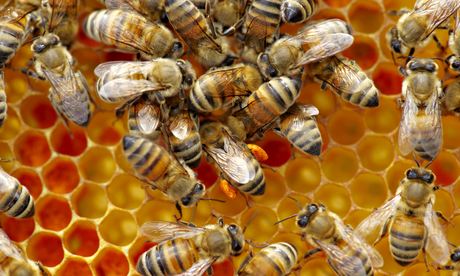
Flora 717 is a bee with problems, right from the start. Her sisters in this batch of lowly sanitation workers emerge modestly: Flora smashes her way out of the pupating cell, in a storm of waxy shrapnel. She's too big, she's too dark, she's grotesquely ugly. But she's strong, a quick learner and she can speak, while others of her caste are mute. In no time she has attracted the attention of an exalted priestess bee, who saves her from summary execution by the deformity police, and finds her "most notable". Soon, Flora has left her despised origins behind, and is rocketing up through the ranks: feeding the Queen's hallowed newborns, tending the darling young grubs; encountering the glorious Maleness of the drones, and even, after a display of savage courage, privileged to attend on the Queen herself.
Playwright Laline Paull's debut novel, a tale of mother courage, conflict and dystopia among social insects, is causing some excitement in the book world. Inevitably, since this is a well-researched fantasy about animals, starring a feisty heroine instead of a band of furry brothers, The Bees is hailed as "Watership Down for The Hunger Games generation". But though Paull has taken plenty of liberties with bee biology, her "characters" are far more alien than Richard Adams's humanised rabbits. Our appealing insect heroine, authentically bee-like in her hive-mind limitations, can seem more like a narrative device than a person: a cypher leading us through the mazes of this strange and fascinating miniature world. But there is more to this worker bee's fairytale biography than at first appears. Danger is coming to the hive in the orchard, and it's not just the threat of "brownfield development" in the framing story. Horror lurks at the very heart of the bees' existence. And Flora, though she doesn't know it, embodies both the greatest threat to her hive, and perhaps their only way out.
Alternately fast-tracked and obstructed, flung into adversity and permitted access to the most sacred scent texts, Paull's Chosen One remains faithful to the eternal law (Accept, Obey, Serve). She is disturbingly different, but willing and intelligent, and fervently devoted to her Holy Mother the Queen. Perpetually bathed in the chemicals that reward and control – blissed-out or reduced to numb slavery – she doesn't really have any choice in the matter. Then something unimaginable happens, and a new chemical imperative takes over. Flora 717 can't help herself: defiance is now her law. Awful crime is her fate. Promoted to the glorious rank of forager, she becomes a bee living a double life, a traitor struggling to survive in the heart of a brutal, fanatically controlled totalitarian state.
Before I read The Bees, I wondered why Paull – a dramatist whose best work (Boat Memory) tackles deeply human issues of racism, prejudice and stolen lives – had chosen to make her literary debut in the insect world. As we discover, when Flora's maternal destiny is made plain, the value of difference and the evolution of racial identity is what her story is all about. I just wonder if this strand – the scandal the priestesses are trying to hide, the secret of Flora's origins, a political thriller in bee world – is made clear enough to the reader. Is Flora's special status the work of a faction in the hive government? Did that first priestess bee know something? I wished a Georgina Smiley bee would turn up, and give me the inside track.
Many of the extraordinary facts packed into this fantasy novel are wonderfully realised. I loved the evocation of bee flight: the foragers like WWI ace pilots, roaring off the landing stage, dodging disaster on every mission; selfless and fantastically brave. Many touches are as playful as Peter Rabbit's little blue jacket. Other elements – the rigid lifetime caste system, the lurid scenes of slaughter when the drones are culled, the gushing crushes on Holy Mother and on Maleness – reflect purely human assumptions about totalitarian states, and gender psychology. And that's OK. The best animal fantasies, however well researched, are studies of human nature. But finally, the crisis The Bees invokes is genuine, frightening and getting worse. Hive collapse disease remains a deadly real-life mystery, although some pesticides are certainly implicated, and "African" outbreeding with A mellifera scutellata (those "big fierce dark bees from down south") hasn't solved the problem. Our pollinators, the world over, are in desperate trouble. And that's no fantasy.
• Gwyneth Jones's The Universe of Things is published by Aqueduct Press. To order The Bees for £11.99 with free UK p&p call Guardian book service on 0330 333 6846 or go to guardianbookshop.co.uk.

